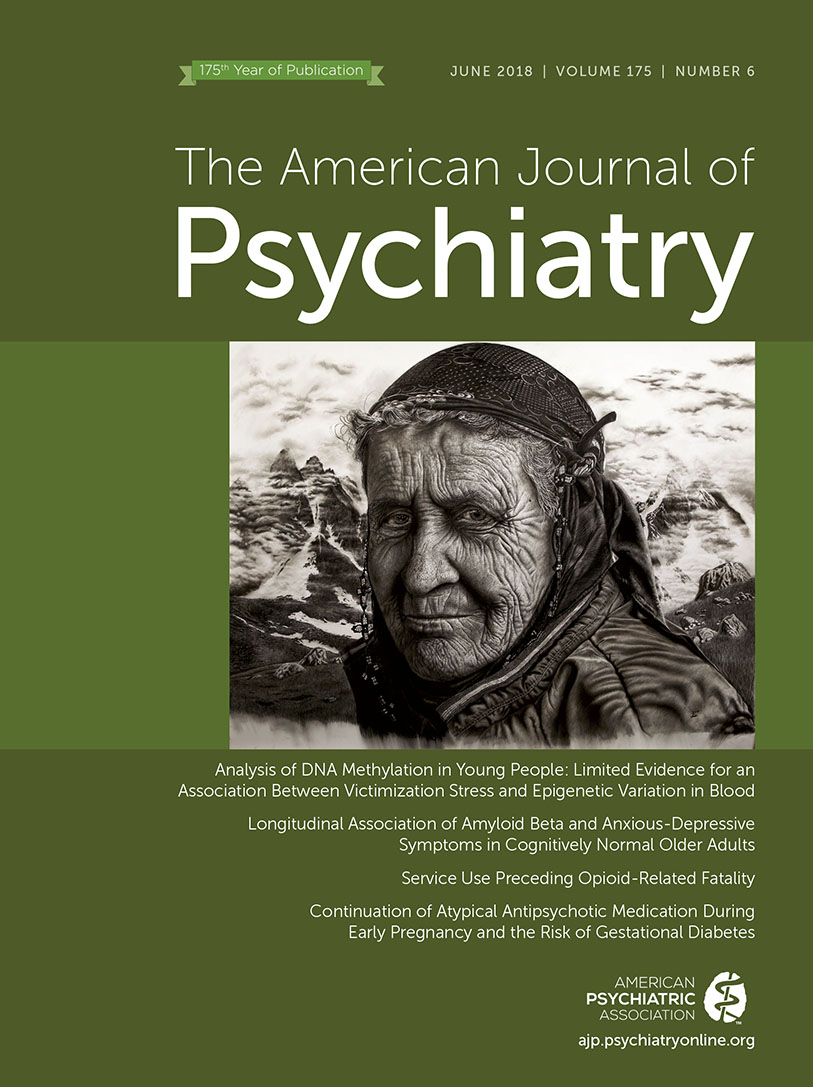No Association Between Antidepressant Efficacy and rs28365143 in Corticotropin-Releasing Hormone Binding Protein in a Large Meta-Analysis
To the Editor: In the March 2018 issue of the Journal, O’Connell et al. (1) report an association between rs28365143, which lies in the corticotropin-releasing hormone binding protein (CRHBP) gene, and efficacy of antidepressant treatment in major depressive disorder. The association was found only in patients treated with the selective serotonin reuptake inhibitors (SSRIs) escitalopram and sertraline, and not with venlafaxine. Under a dominant genetic model, patients carrying the minor allele A showed worse treatment outcomes compared with GG homozygotes. The article uses 636 participants from the International Study to Predict Optimized Treatment in Depression (iSPOT-D), with replication in 141 participants from the Predictors of Remission in Depression to Individual and Combined Treatments (PReDICT) study. The article does not report results from the genome-wide meta-analysis of the Genome-Based Therapeutic Drugs for Depression (GENDEP) project, the Munich Antidepressant Response Signature (MARS) project, and the Sequenced Treatment Alternatives to Relieve Depression (STAR*D) study (2,256 participants) (2). This meta-analysis shows no evidence of association between rs28365143 and antidepressant remission (p=0.70) or symptom improvement (p=0.54) (3).
The study from O’Connell et al. highlights the challenges in analyzing candidate gene studies with participants across ethnic groups. Studies of antidepressant response are particularly susceptible to population stratification because response differs by ethnicity (for example, African Americans had substantially lower remission rates than Caucasians in the STAR*D study [4]). Combined with allele frequency differences across populations, ethnic differences can lead to artifactual results that reflect genetic ancestry and not genetic association. Adding ancestry-informative principal components as covariates in the regression analysis protects against false positive results, but this was not possible with the candidate variant genotyping in the iSPOT-D. The authors performed a sensitivity test showing that the effect size for rs28365143 was similar in Caucasian iSPOT-D participants (60.1%) and non-Caucasians (39.9%; see Table S4 in the data supplement accompanying the online edition of the original article). This may not be a sufficient control because the non-Caucasian group included black, Asian, other, and missing races (see Table 2 in the article). In addition, the frequency of the rs28365143 A allele differs by ancestry (3.5% in European populations; 18.4% in African populations) and is missing in East Asian populations (5).
As a direct test for replication of the study findings, we performed a meta-analysis of rs28365143 association with SSRI remission and symptom improvement in 3,065 participants with major depressive disorder from seven samples (6–9). In our analysis, rs28365143 was imputed according to methods previously described (imputation quality was good in all samples), and the analysis used an additive model with principal components (10). All patients were Caucasian and were treated with SSRIs (citalopram, escitalopram, fluoxetine, paroxetine, and sertraline). Alpha was set at 0.05, and our sample size provided adequate power (>0.80) to detect an odds ratio of 0.31 corresponding to the effect reported by O’Connell et al. (11). We found no significant association of rs28365143 with symptom improvement (p=0.15, beta=−0.09, 95% CI=−0.22 to 0.03) or remission (p=0.11, odds ratio=0.79, 95% CI=0.60–1.06), although the direction of effect was the same as found by O’Connell et al. Results using a dominant model were similar to the additive model probably because the low minor allele frequency makes these models equivalent.
Independent replication represents a fundamental step in pharmacogenetics. Our negative meta-analysis in larger samples cautions against accepting results from small selective replication instead of using large, available data sets.
1 : Antidepressant outcomes predicted by genetic variation in corticotropin-releasing hormone binding protein. Am J Psychiatry 2018; 175:251–261Link, Google Scholar
2
3
4 : Evaluation of outcomes with citalopram for depression using measurement-based care in STAR*D: implications for clinical practice. Am J Psychiatry 2006; 163:28–40Link, Google Scholar
5 1000 Genomes Project Phase 3: rs28365143 allele frequencies. http://www.ensembl.org/Homo_sapiens/Variation/Population?db=core;r=5:76951761-76952761;v=rs28365143;vdb=variation;vf=8792695(Accessed Jan 10, 2018)Google Scholar
6 : A genomewide association study of citalopram response in major depressive disorder. Biol Psychiatry 2010; 67:133–138Crossref, Medline, Google Scholar
7 : Genome-wide pharmacogenetics of antidepressant response in the GENDEP project. Am J Psychiatry 2010; 167:555–564Link, Google Scholar
8 : Genetic predictors of response to serotonergic and noradrenergic antidepressants in major depressive disorder: a genome-wide analysis of individual-level data and a meta-analysis. PLoS Med 2012; 9:e1001326Crossref, Medline, Google Scholar
9 : Pharmacogenomics of selective serotonin reuptake inhibitor treatment for major depressive disorder: genome-wide associations and functional genomics. Pharmacogenomics J 2013; 13:456–463Crossref, Medline, Google Scholar
10 : New insights into the pharmacogenomics of antidepressant response from the GENDEP and STAR*D studies: rare variant analysis and high-density imputation. Pharmacogenomics J (Epub ahead of print, Nov 21, 2017)Google Scholar
11 : G*Power 3: a flexible statistical power analysis program for the social, behavioral, and biomedical sciences. Behav Res Methods 2007; 39:175–191Crossref, Medline, Google Scholar



